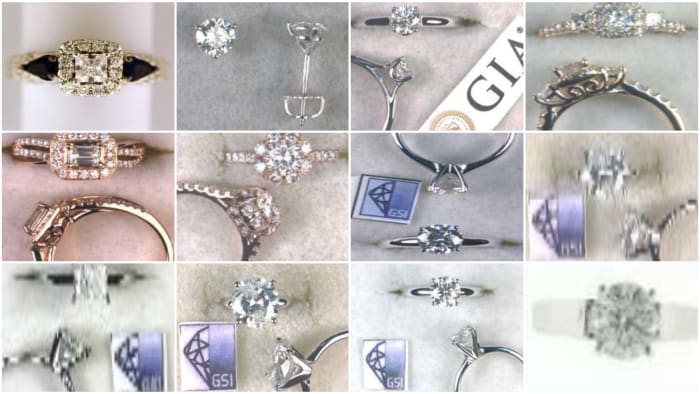An Oakland County store is accused of buying stolen jewelry from more than 30 smash-and-grabs over the span of several years and reselling it to customers as part of a “fencing” operation.
Maro Jewelers, Inc., in Oak Park, is named in an April 10, 2024, court filing, which argues that $172,380 seized from the store should be forfeited because it was earned illegally. The complaint for forfeiture was submitted by the United States Attorney’s Office.
Cash and jewelry were seized from the store on April 5, 2021, during an FBI investigation into a series of robberies at jewelry stores across the country by “highly-organized groups.”
Smash-and-grabs
Officials said more than 30 similar smash-and-grabs were carried out at jewelry stores from August 2018 to April 2021. The targeted stores were in Michigan and other states.
Court documents say many of the robberies involved people who live in Metro Detroit and were planned in the Detroit area.
Typically, two or more people would walk into jewelry stores and use a sledgehammer to break glass display cases, officials said. The thieves would then grab jewelry, including loose diamonds, from the cases and run away.
The getaway vehicles used in these thefts were usually Chryslers that waited outside the store, officials said.
Thieves would often monitor the targeted stores in the days leading up to the robberies to learn where specific jewels were kept.
Grab-and-go thefts
A number of “grab-and-go” thefts have also been linked to this same operation, according to court records.
In these cases, one or two women would walk into jewelry stores and ask to see certain diamonds.
When they got a chance to flee, the women would grab the diamonds and run out of the store, officials said.
‘Fencing’ stolen items
In the complaint, officials outlined the meaning of the term “fencing.”
Stolen items are sometimes sold to a business known as a “fence,” which acts as a middleman between thieves and consumers.
Typically, a “fence” buys stolen items from thieves at a discount and then resells the items for a higher price to customers who don’t know that they were stolen.
“The thief is willing to accept a lower amount because he benefits by obtaining an immediate profit and reducing the amount of time he remains in possession of stolen goods, while the fence takes on the risk of possessing, and potentially being caught reselling, the stolen goods,” the complaint reads.
A “fence” will often hide the stolen items by running an otherwise legitimate business at the same time, officials said.
Maro Jewelers is accused of operating as a “fence” on “numerous occasions.”
Stolen jewelry
At the time of the seizure in April 2021, Maro Jewelers had $148,996.89 worth of stolen jewelry in its inventory, officials said.
“This includes several items that exceed $10,000 in value, including two diamond rings stolen from Michigan locations of Kay Jewelers worth $19,999.99 each, and a loose diamond stolen from a Texas Jared location worth $13,240.00,” the complaint reads.
Diamond stolen in Indiana
FBI agents said they have evidence — including a receipt from the store — that Maro Jewelers bought a diamond matching the description of one that was stolen from Kay Jewelers in Noblesville, Indiana, on Feb. 6, 2021.
The diamond was bought by Maro Jewelers at a fraction of its value — $2,420 compared to $7,799.99 — officials said.
Ring stolen in Dearborn
On March 16, 2021, a woman stole a white gold solitaire ring worth $7,000 from the Zales store at the Fairlane Town Center in Dearborn and gave it to a co-conspirator, police said.
Officers never found the stolen diamond, but they arrested the co-conspirator while he left Maro Jewelers with $2,078 cash in his pocket, the complaint says.
Police believe the man sold the ring to Maro Jewelers before officers arrived, but the person who spoke to police on behalf of Maro Jewelers at the scene lied about the true nature of the transaction.
Link to 2 thieves
Officials believe Maro Jewelers served as the “fence” for Brian Moore and Darrell Reed.
Moore and Reed recently pleaded guilty to robberies that were similar to the ones in this case.
The complaint argues that without a “fence,” the smash-and-grab robberies would be “impractical,” and therefore might not happen at all.
Money laundering
The complaint also accuses Maro Jewelers of conspiring to launder money by mixing the proceeds from the stolen jewelry with legitimate profits.
“Maro Jewelers profits from the fencing of stolen jewelry, then intermingles legitimate money with illegitimate money earned from fencing, further concealing the nature, source, location, and ownership of the stolen goods and proceeds,” the complaint reads.
Conclusion
The complaint concludes that Maro Jewelers is subject to federal forfeiture of the money made through money laundering and/or knowingly selling stolen goods.
Feds formally requested an arrest warrant and that the money be forfeited.
